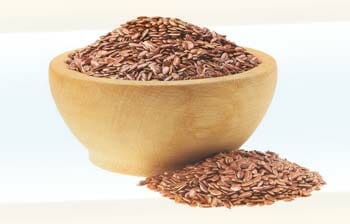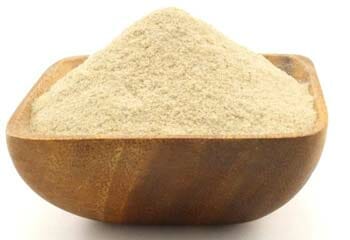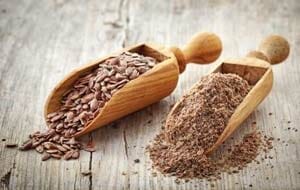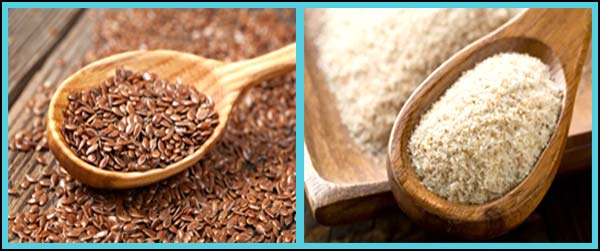It is easy to get over the daily limit of carbohydrates and still lack the necessary fibers. Investing in naturally rich fiber-filled ingredients like flaxseed and psyllium husk is a great way to make up for it. However, since they are very similar in several aspects, it may be challenging for people to choose the better one.
But worry not - we are here to show you both the advantages and disadvantages of flaxseed vs psyllium husk so you can find the best option according to your needs. Let's get right into the and explore all these two sources of fiber can offer!
What Is Flaxseed?

Flaxseed is considered to be one of the best sources of fiber. It is grains procured from flax plants (or Linum usitatissimum) that grow up to 2 feet tall. People have used it for thousands of years because of the variety of health benefits it offers.
The first ever population to cultivate it was the Babylonians. They started growing it 5000 years ago and made it so popular that the French King Charlemagne made a law regulating its consumption in the 8th century!
If you have never tried flaxseed, you should know it tastes similar to nuts. It's also used to produce oil and cereal or manufacture linen fabric. You can also find it among the ingredients of your pet food or in various health food recipes.
Benefits Of Flaxseed
Flaxseed is a common occurrence in health food stores. Why is that so, you ask? Here are only some of the health advantages you can get from it if you add it to your diet:
Lots of Nutrients
Flaxseed is mainly known for its dietary fiber content. It is crucial in diets that focus primarily on fat or protein and thus lack carbohydrates.
Fiber is an indispensable carbohydrate the body requires to carry out its daily activities smoothly. That is where flaxseed can work its magic by providing the necessary fibers without going over your daily carb limit.
Additionally, flaxseed is an excellent source of healthy fats, proteins, magnesium, and potassium. All these together make it a highly sought-after item in any healthy diet.Improved Cardiovascular Health
If you are already taking medications for high blood pressure, you can add flaxseeds to your daily dishes to naturally reduce it to a healthier level. A Canadian study shows that having just 30 grams of flaxseed daily for six months will lower diastolic and systolic blood pressure by 7 mmHg and 10 mmHg, respectively.
Besides, flaxseeds are good at lowering bad cholesterols like low-density lipoproteins or LDL. Such cholesterols can push you toward cardiovascular diseases like atherosclerosis, triggering other complicated diseases.
One study at the University of Toronto observed that adding flaxseed to your regular diet will lower the LDL levels by 18% and the overall cholesterol levels by 9%. So you can start including flaxseeds in your daily meals to boost your cardiovascular or heart health!Blood Sugar Under Control
Another common health issue flaxseeds can help with is high blood sugar levels. Not maintaining this one factor can contribute to triggering type 2 diabetes in people.
In several studies, having only 10-20 gm flaxseeds daily for a month or longer has shown up to a 20% reduction in blood sugar levels. Researchers hypothesize this is due to the insoluble fiber content of these seeds. It positively affects blood sugar levels by slowing their secretion into blood.
Lower Appetite
If you are on a weight loss journey and struggling with frequent cravings, introducing flaxseeds into your diet can help to suppress your appetite. Its soluble fiber makes digestion slower in the stomach, and the hormones for controlling the appetite are activated.
As a result, you won't crave snacks in between meals and feel full for a longer time. That can naturally help you be more focused and productive and spend less time thinking about all the extra food that would bring back your lost weight!
Side-Effects Of Flaxseed
As many benefits as this ingredient has, it also has a few side effects. Here's what you need to know:
Digestive Issues
Not maintaining a healthy dosage of flaxseed can lead to serious digestive issues and poor digestive health. Excess consumption of this food item usually causes abdominal discomfort and increased bowel movement. Such situations lead to painful conditions like diarrhea, stomachache, and bloating. On the plus side, only a bit of this food can help you with constipation.
Allergic Reactions
Flaxseed causes allergic reactions in some people. Usually, this happens while using flaxseed oil, which may cause itching, swelling, redness, or similar conditions. Stop consuming flaxseeds immediately and seek medical help if you observe these symptoms.
What is Psyllium Husk?

Psyllium refers to a group of plants with similar characteristics that are popular for their high fiber content. The seeds of these plants, named Plantago, are mainly used to obtain their husks. The husks make for a great source of daily nutrition.
There are more than 200 species of this plant group. Most are cultivated in India, the former Soviet Union, and some European countries. Another popular name for psyllium in Southeast Asia is Isabgol, which translates to “horse flower.”
After planting, you will see the first flowers within 60 days. The seeds of these beautiful white flowers contain a soluble fiber or hemicellulose called polysaccharide heteroxylan. Most of its beneficial properties come from this source of soluble fiber.
Benefits Of Psyllium Husk
If ground flaxseeds are not your thing and you want to try psyllium husk instead, here is what this rich source of fiber can help with:
Easier Digestion
The main appeal of psyllium husk is its ability to improve your digestive health. That is why you will often find it listed as one of the significant ingredients for commercially produced laxatives. Its water-soluble fiber enables smooth bowel movements by making the digested food softer.
Because of this and the added moisture, it becomes easier for the colon to pass the stool, and thus, it relieves you from constipation pain.
Cardiovascular Health
Psyllium husk can protect you from heart diseases by reducing cholesterol levels in the blood. This health claim was checked out and approved by the FDA in 1998. To let the husk effectively impact your cardiovascular health, you will need to consume at least 7 gm of it daily.
Weight Loss Assistance
You can include psyllium husk in your daily diet routine to make your weight loss journey easier. Although its effect may not be as evident as other diet components, psyllium does help you to stay satiated longer than usual, which prevents you from snacking.
Diabetes Control
Like most soluble dietary fibers, psyllium husk is also effective at reducing glucose. If you are a diabetic, psyllium husk can help you bring balance to your blood level and maintain a commendable glycemic balance.
Side-Effects Of Psyllium Husk
We've mentioned some of the benefits of this amazing source of fiber. Let's now focus on some of the downsides that may come with it:
Abdominal Issues
While psyllium husk is fine in smaller doses, eating it without being mindful can lead to more bad than good. Doing so can lead to bloating, abdominal cramps, and gastric issues. Besides, always consume it with enough water so you don't have to suffer from bowel obstructions later.
Allergic Reactions
In a few rare cases, psyllium husk can trigger allergic reactions like anaphylaxis or asthmatic attack. People suffering from such reactions usually display itching, rashes, and troubled breathing. To stay away from all these, seek medical advice before starting to consume it.
Comparing Psyllium Husk Vs Flaxseed

Applications
Both psyllium husk and flaxseed are great sources of dietary fiber. However, these ingredients have many other applications besides being a good fiber source.
Flaxseed is used as an oil, pet food, and sometimes to produce linen fabric. On the other hand, psyllium husk is used as a thickening agent and in laxatives.
Nutrition Content
While they offer very similar benefits for your body, their nutritional values differ slightly. You can check out the exact measurements of these nutrients for a tablespoon of each item here:
Psyllium Husk | Flaxseed (ground) | Flaxseed (whole) | |
|---|---|---|---|
Calories | 20 | 36 | 50 |
Carbohydrates | 5g | 2.3g | 3g |
Fiber | 3g | 2.2g | 3g |
Fat | 0g | 3.3g | 4.5g |
Protein | 0g | 1.6g | 2.2g |
Regarding overall nutritional content, flaxseeds are the better choice since psyllium lacks fat and protein. However, psyllium is the better choice regarding calorie count since it is almost half of flaxseeds.
Omega-3
If fat is essential to your diet, you will need more flaxseeds than psyllium husk. As you can see from the chart above, psyllium doesn't provide any fat. So, taking it will only increase your carb count, which can be a downfall in strict high-fat, low-carb diets like keto.
On the other hand, flaxseeds can deliver omega-3 fatty acids through a constituent called alpha-linolenic acid (ALA). One tablespoon of whole flaxseeds can grant you 2.5g ALA, and that of ground flaxseeds provides 1.8g ALA.
Lignans
Lignan is a compound obtained from plants that act as antioxidants and phytoestrogens. These properties can help you to stay away from hormone-associated cancer. The lignan content of flaxseeds is known to be 800 times higher than other similar options, including psyllium husk.
Bottom Line - Which One Is For You?
As you can see from the debate on flaxseed vs. psyllium husk, the right option depends on your specific dietary requirements and your medical conditions. If you suffer from bowel irregularities, neither of them is a good idea since they both can have adverse effects.
You should consider ingesting flaxseeds if your diet needs more fat and protein, but choose psyllium husk for a lower calorie count. Flaxseeds can also be an excellent source of lignan, which lowers cancer risks.
Thanks for sticking with us through this guide, and much love from SearanchLodge.
About the Author
Tamara J. Sims
EXECUTE CHEF
As a seasoned kitchen and food writer, Tamara has a remarkable ability to weave words together, transporting readers to the heart of the culinary world. Tamara’s articles are written with an engaging blend of insightful commentary, honesty, and real-world examples based on personal experiences. She has the ability to captivate seasoned food enthusiasts and novice cooks alike.
SeaRanchLodge.com is a participant in the Amazon Associate program and will earn from qualifying purchases.


